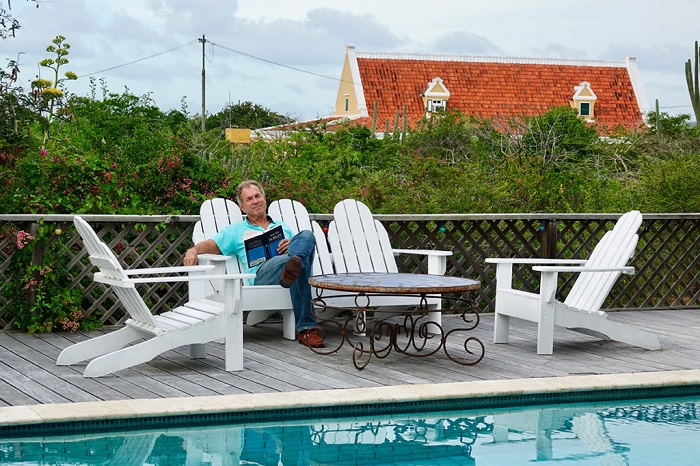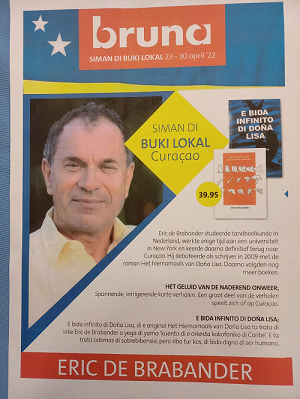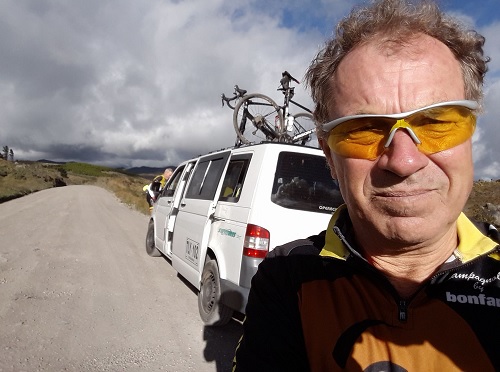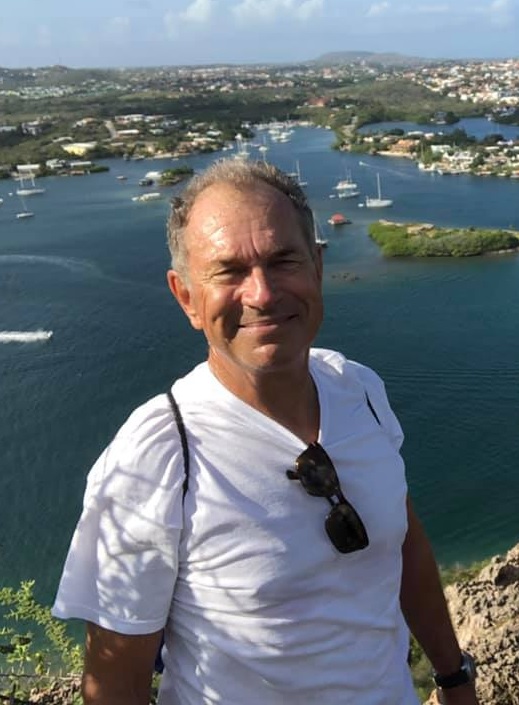Influencer Eric de Brabander
Interview May 2022

Picture: Ellen Spijkstra
Could you share with us some information about your family life?
I was born to a Dutch-Swedish father. My grandfather from my father’s side had business interests in Colombia, that is how my father ended up in Curaçao. My mother was born in Utrecht, to be exact, right under the “Dom”. She passed away three years ago. I have eight brothers and sisters, one passed away. Four of my siblings live in Curaçao, one in Bonaire, the other ones in Bonaire, Panama, and Holland. I was born in Holland and grew up in Curaçao in a family with strong family ties. My parents supported me in my choices. Have you read the book “De zeven vinkjes” from Jos Luyendijk? Well! I have “seven vinkjes”. By the way, I don’t think “De zeven vinkjes” is applicable on our island because with only one “vinkje”, you can become the prime minister here. I am married to the artist Ellen Spijkstra and we have two children. Both have studied in Holland, both live in Curaçao and both have “seven vinkjes” I suppose. We are a “closed nit” family, Ellen and I have a great relationship with all family members. The ones living here visit us regularly on Sundays, it feels like a “sweet invasion” or in Dutch “een zoete inval”.
,
Could you share something about your educational background and your experience?
After High School (Radulphus College) in 1972 I went to Holland to study dentistry. Early on in this new country I couldn’t get into a good rhythm, the relationship with my dad deteriorated and I was wandering around, working on a ship, working in a nuclear plant in Germany, did different other things, but in the end I did graduate as a dentist in 1979. In 1980 I migrated back to Curaçao after marrying my present wife. She was willing to live for a maximum of 4 years in Curaçao. She felt isolated from the rest of the world at first. There was no internet at that time and we did not have too much money to travel. I wrote a grant for a scientific study I wanted to do and was accepted at Rochester University Eastman Dental Center New York. I continued my studies there, worked as a dentist and published my research papers. After some years I had it with the academic world, as it wasn’t as I expected it to be, and returned to my dental practice in Curaçao. During those years, I met Leo Wolters, who got stranded in Curaçao after a hiking tour through South America. I took him to my dental office, after I realized how competent he was as a dentist and a friend, I offered him a partnership. It turned out to be a 35 years old partnership, we never had any kind of disagreement that ended up on the wrong side. That is, if I don’t mention the day he refused to hoist the spinnaker on my sailing boat in a race because he was having a beer. Unfortunately, my friend and partner Leo passed away last year. A brain tumor ended his life, a great shock to all of us.
You have always been academically involved, could you give us some examples of the activities you have undertaken?
As I was working as a dentist, I kept my liaison with the University of Groningen and with Rochester University. I organized different conferences on our island. I was the mentor of about 30 students during their internship in our office that expanded into an office with eighteen health workers as of today, and mentored some of them with their final thesis. I have written their study protocols, of which some got as far as a published article in one of the peer-reviewed dental journals, one of them about the bipolar relation between periodontitis and diabetes, another about the health benefits of drinking water fluoridation. I have mentored two students that got their Ph.D. I have always directed the focus of our dental studies on a theme that would benefit the dental health of Curaçao.
We know you to be a dentist. Can you expand a little more on your career path?
Well during these past 35 years, I have always worked 6 weeks in Holland and as I have explained, I have been involved academically with different things. My dentist practice has grown into a group practice consisting of 4 dentists and 18 collaborators. I have the option to retire now, but for the moment I am not considering this as yet.
We know that you are also active as an author? You have become a prolific writer in the past 24 years. Why did you start writing, and was there a reason to start writing later on in your life?
I knew that I could write. In 1969, I went through a career choice test and the psychologist told me that the results showed that intellectually I could do whatever study I wanted to do. But he also told me that maybe becoming a dentist was not such a good idea as the test indicated that I lacked human compassion and that maybe I should consider studying economics or econometrics. The test also showed that I was linguistically strong, so a literary or language study was also one of his recommendations.
I have been writing scientific protocols and articles over the years, which by the way requires a special writing style, but it was still writing. For example, the abstract of your article needs to be concise and short, otherwise, the reader might lose attention. I am married to a ceramic artist and as our children left the house for their studies, my wife Ellen once told me soon after the children left, that she would never stop working as long as she was able to do her work. She suggested to me, to also “do my thing” and she would “do her thing” so we had something to talk about in the evenings under our tamarind three. I realized that ‘that thing’ could not be dentistry.

That same evening in 2003, I started writing and my first book, published in 2009, ended up on the long list of the prestigious Libris Literature Award or Libris Prize (Dutch: Libris Literatuur Prijs) The novel ”Het hiernamaals van Don Lisa” was translated in Papiamento and is at this moment translated in English by the well known book publishing company Peter Lang in New York. More of my books have been translated. As of today I wrote eight novels, different essays and I was co-author of two children’s books.
You seem to be a happy man?
Well, happiness and satisfaction come with flurries. The biggest common divisor is true, that I am a happy man.
We know you to also be a reviewer of books and an activist. Can you tell us more about that?
As I started writing my books the publisher asked me to review some manuscripts. Which I did and later on ‘Het Antilliaans Dagblad asked me to review books for them. I only review books that I consider to be good books, as nobody benefits from a bad review, and bad books won’t be remembered anyway.
Where do you get your inspiration?
There are so many life stories that I write about. Most of my books have a biographic, sometimes an autobiographic component. They are things that I have experienced or have seen during my travels and in my profession as a dentist, I meet such a diversity of people. Sometimes I schedule an hour for an interesting patient while I could have treated him or her in 10 minutes, just to satisfy my curiosity.
Are you passionate about understanding “human beings, people”?
I am interested in people, but I am not passionate about it. Passion is a kind of monomanity. According to my enneagram personality test that I took some time ago, there are too many ‘passions’ that took a bite out of me that you can hardly call them passions anymore.
What triggers you to be critical of politics at times?
I believe my “sense of justice” is quite big. You have two choices, either you can get irritated and annoyed at the level of incompetence that our politicians display, or you do something about it. Public Health is my field of expertise and I have a whole network of capable health workers around me. For years ‘quackery in healthcare’ has been costing our healthcare system lots of money, also causing countless casualties while our government looks away. So I started “Skeptico” with a group of competent health workers. Skeptico’s goal is to offer a helping hand to politicians, and to keep the public informed about all kinds of misbehavior in health issues.
If you call “a problem that we single out”, being “critical” it’s okay to call it that, but keep in mind, that we never mention a problem without suggesting solutions to the problem. Our intentions unfortunately stirred some big waves in the past since we expose ulterior motives, money, and power for example, that lead to wrong decisions in our government. However, as I am growing older, I am becoming wiser and now I am not trying to change the unchangeable, as these things are so rooted in our mini-society. I don’t get angry anymore, but I do still get surprised by human behaviour.
What is your BIG WHY or driving motivation to be who you are right now and do what you are doing now?
As everything is transient, I don’t expect that 50 years from now people would still be reading my books.
I am interested in the here and now. I hope that I influence people in the here and now, as I have known so many other people that have influenced me.
What are your plans for the coming years and when do you consider that you have been successful in your personal and business/professional life, let us say 5 years from now?
As I am now 69 years old, it is about time to stop working professionally as a dentist in the nearby future. I hope to publish more books, since I love writing and telling stories. Furthermore, together with my wife, as we are all transient beings, we will be looking old age in the eye.
What are the challenges that you are dealing with? And how are you dealing with these different challenges you confront?
My biggest challenges are behind me. They are all that I have done and have achieved in my professional field as a dentist and as an academic. Yes, I am a dentist and I do want to offer the best I can to my clients. But this attitude I also have when I am writing a book, when I am biking, sailing, or scuba diving, I am so “stingy to live life”. I am a multi-faceted person that devours everything that comes on my path.
Do you use your inner voice to evaluate when dilemmas show up? How does that work for you?
My inner voice is a difficult concept to define, I don’t think I have a 6th sense. I do feel the hair on my neck standing up when someone with bad energy enters the room I am in. That is it. I am afraid that my EQ (Emotional Intelligence) is not high.
But you get well along with people?
Yes. I walk away from ugliness most of the time.
How are you trying also to keep up with your knowledge and skills levels?
With courses, books, and reading scientific magazines like every professional.
What are your strengths?
I have a good overall view of things.
I am multi-faceted.
I can find my way and get along well in all the diverse and different segments of our multi-cultural society here in Curaçao. Maybe you should ask others to give you their opinion on my strengths, ha, ha
On being a multicultural society
By the way, on that note. Dr.Robert Rojer has been an example of humbleness and persuasiveness. He used to be a medical specialist working at SEHOS. During the nineties, the Dutch government was planning to stop financing NASHKO (Netherlands-Caribbean Foundation for Clinical Higher Education). Dr. Rojer addressed the Dutch parliament and stated that Holland was underway to become a multicultural society quickly and what better way to learn about cultural diversity than continue the collaboration with Curaçao using NASHKO and learn from this. It works up until today. NASHKO is still doing its work.
Do you have hobbies or interests that you are also passionate about?
Not passionate but I do a lot of sports. Next week I will fly to Amsterdam and will bike to Santiago de Compostela in Spain. I love sailing and have just bought a sunfish to sail and at times compete with others. I scuba dive, swim long laps. I used to play water polo, too old for that kind of competition right now. I read a lot, around my bedroom you will find staples of books and I can get lost in these books. And then there is my family.
If you as Eric would meet a stranger on the bus and they would ask you to introduce yourself, what would you answer?
I will not tell them much about myself at first, maybe my name and that I am a dentist. I would prefer to turn the table and ask them questions and I would listen to them very well.
How would you describe Eric in one word or one sentence?
Stingy for knowledge and experiences.
Who are the persons that have inspired you the most in your career?
I would say Wim Statius Muller, the wise old man, always positive about the negative, dr. Robby Rojer, a walking dictionary. Dr. Basil Bisby, an old scientist in Rochester, long dead now. He taught me perseverance, to not give up. Jan Brokken, a Dutch author who taught me how to extract things out of life to write about. Guido Goesaerts who taught me to see life through the eyes of a philosopher. Leo Wolters, my partner in dentistry. My friends Hans Kelderman and Ernest da Costa who have an unconditional love for life and people. And of course my wife, Ellen. And my kids, who continue to surprise me every day.
What is a trait that is still a work in progress?
Getting carried away too much by my emotions. I do feel them and allow them to do their things.
What was a defining moment in your life?
My time working in the USA, there is where I discovered my love for science. We have science and we have nothing better than science.
Where do you want to be 10 years from now with your life/ career?
I would almost be 80 years old and enjoying the presence of my grandchildren.
What would you want your Loved Ones, family, friends, and others to say about you let’s say 20 years from now?
I hope that they have learned something from me and that I have contributed positively to the way they are thinking.
What makes you stay optimistic about the future of Curaçao as we are in the middle of a worldwide pandemic, recession, and in the middle of growing environmental challenges because of the global warming consequences?
The title of Boeili Van Leeuwen’s book: “Geniale Anarchie”. He describes perfectly how I see Curacao, that despite all the racial and social-economic challenges we have, this island is still afloat after 65 years of self-autonomy.
More info
Website: Eric de Brabander
One of the 250 Influencers of Curaçao
Eric de Brabander is a multi-faceted, stingy, curious, live-loving, author, scientist, activist, and family man, that has spent his life up to now, doing what he loves to do. From a young age, he knew that he had linguistic talents, but pursued a lifelong career as a dentist up to now and coupled this with his ambitions to be a scientist, as he has always been a curious person. Apart from his track record as a scientist, Eric has been remarkably productive in writing 8 books up to now in the past 20 years or so, as he continues his writing while at the same time pursuing everything that crosses his path that he considers interesting enough to pursue and experience. Through his travels and his more than average interest in people he meets, his ability to find his way and get along well in all the diverse and different segments of our multicultural society in Curaçao, has been his inspiration, which kept him writing more books that he plans to write. His activism stems from his “big sense for justice” and this has let him speak out against excesses in the health care in Curaçao, as he made a habit of not only mentioning the problem but also at the same time was willing to suggest solutions to the problem. This has not always been appreciated by certain politicians, as he addressed these issues as part of a network (Skeptiko”) of medical specialists and physicians, that he formed.
For all these reasons, we deeply love and respect Eric, as he uniquely has and still is contributing positively to our society. We consider him one of the 250 influencers of the islands representing the “Health Care and Cultural sector ”. Look at the list of the Influencers we have interviewed or reported on, up to now.
“Promo boekpresentatie Eric de Brabander” – YouTube
“ELIS JULIANA, ERIC de BRABANDER, AART BROEK, en FRED de HAAS” – YouTube





